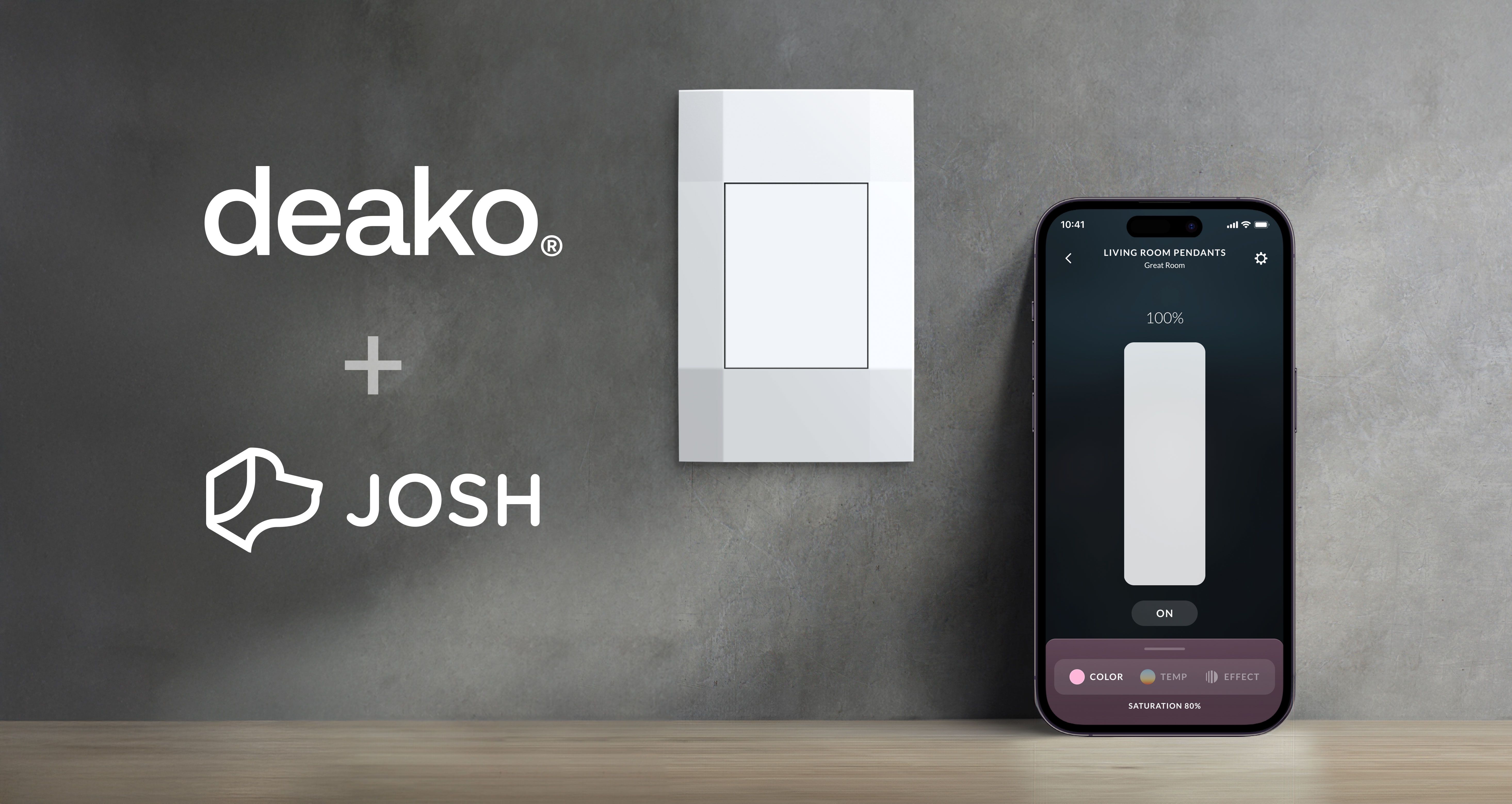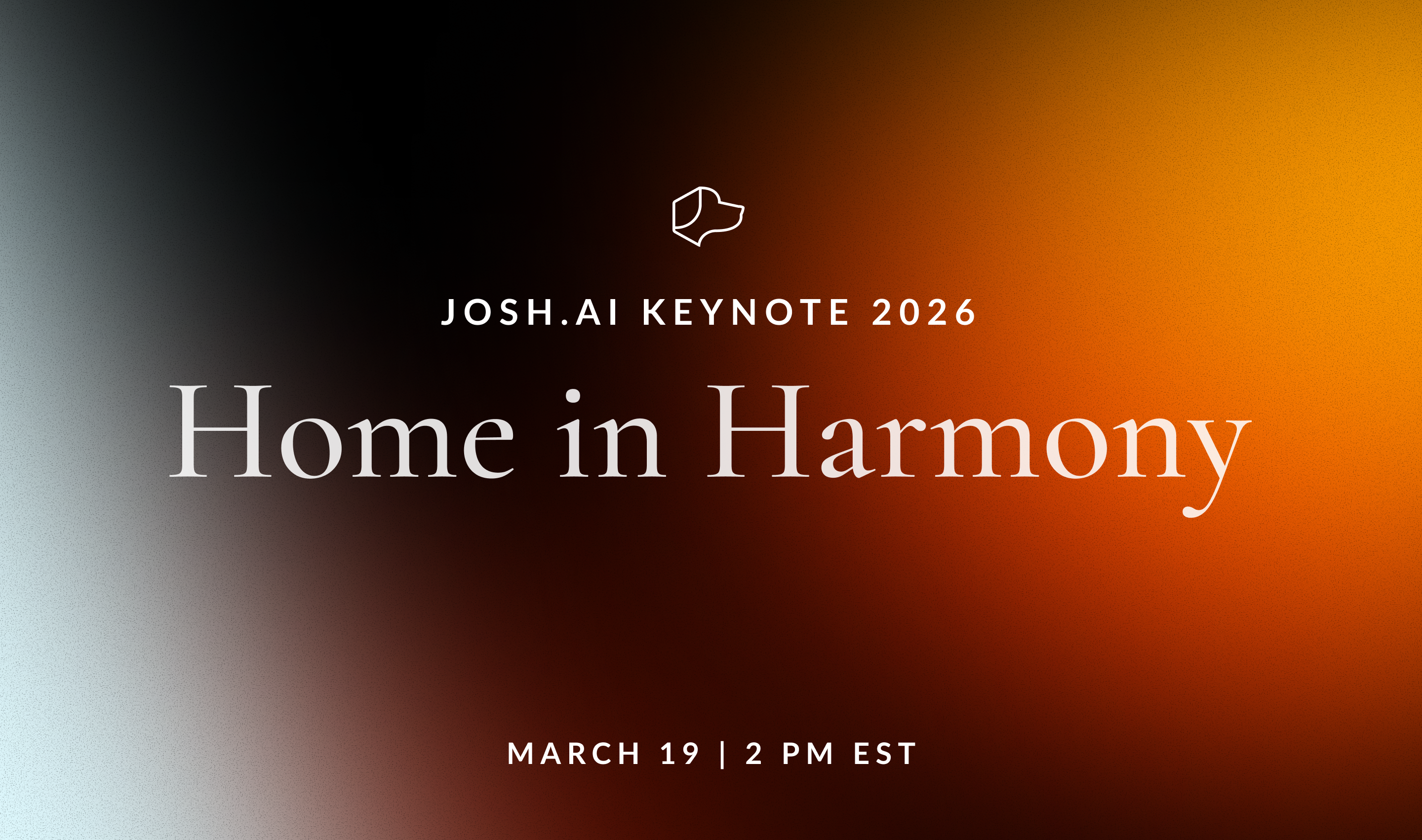Smart Home Day Exclusive: CEO Alex Capecelatro on AI & the Future of Custom Installation
In celebration of Smart Home Day 2025 and in collaboration with the team at Lenbrook, Josh.ai is proudly sharing exclusive insight from our CEO, Alex Capecelatro, with his thoughts on AI and its impact on the future of custom integration. Enjoy the complete interview below and view the editorial by Lenbrook here.

The Role of AI in Home Control
From your perspective, how does Josh.ai’s new AI platform represent a shift in how we think about smart home control?
Alex: AI is changing the idea of home control from something you manage to something that works alongside you. With our new AI X OS platform, Josh.ai is helping move the smart home beyond simple commands and toward real understanding. Instead of just saying “turn on the kitchen lights,” you could say “Get the room ready for dinner,” and Josh would respond intelligently based on your preferences, the time of day, and what’s happening around you. The goal is a home that anticipates your needs and feels truly personal.
What differentiates Josh.ai’s approach to AI compared to other control systems in the market today?
Alex: What makes our approach different is that AI is at the center of everything we do, not an add-on feature. AI X OS brings intelligence into every part of the system, including lighting, audio, video, cameras, and environmental controls. Our new Lighting Intelligence Controller offers full control of color, tunable whites, and circadian lighting. AI Scenes make it easy for homeowners to create or even discover automations that fit their routines. The platform also adds AV over IP support, allowing faster and more flexible distribution of audio and video throughout the home.
We’re also introducing new products like Josh Edge and our new larger Josh Touchscreen, giving people natural ways to interact with their homes through voice, touch, and physical controls. And because privacy is at the core of our philosophy, Josh processes as much as possible locally so data stays in the home where it belongs.
AI X OS represents the next stage of smart living. It’s about creating spaces that are intuitive, private, and beautiful. Homes that think alongside you, making it easier and more enjoyable to focus on the things that matter most.

Natural Interaction & Voice Control
Josh.ai emphasizes secure, natural voice interaction. How important is that to the client experience in your projects?
Alex: Voice control has always been at the heart of what makes Josh.ai special, but it only works if people trust it. Privacy and security are absolutely essential to that trust. When clients invite technology into their homes, they’re also inviting it into their personal lives. We believe no one should have to trade privacy for convenience. That’s why Josh processes as much as possible locally, doesn’t sell data, and gives homeowners complete control over how their system listens and responds.
What do you think voice control still needs to improve on, and how close are we to “frictionless” interaction?
Alex: Natural interaction is equally important. The goal is for people to speak to their homes the same way they would speak to a friend. But human language is full of nuance and ambiguity, which is where voice systems still struggle. A command like “turn on the lights” might sound clear, while “turn on the living room” could mean different things. Should the lights come on and to what level, should music start and what music, should the shades open, etc? It gets tricky. And what about “turn on Coldplay” or “turn on The Office”? Those sound simple, but they can be confusing when words overlap with other devices or functions. For example, is “The Office” the show or the room?
This is where AI and large language models are making a huge impact. By using contextual awareness, understanding who is speaking, where they are, and what they typically do, Josh can interpret intent more accurately. Over time, the system learns patterns and adapts so interactions become smoother and more natural.
We’re getting very close to what I would call frictionless interaction. The progress in natural language processing and contextual reasoning is happening fast. The key is making that power invisible so the experience feels effortless, secure, and personal. That’s what we’re building toward with Josh.ai.

Adaptive & Personalized Living Environments
Josh.ai’s platform allows for systems that learn and adapt to the homeowner’s routines and preferences. How have you seen this impact daily life in smart homes?
Alex: AI driven personalization is one of the most exciting parts of what we’re building, but it’s important to be honest about where the technology is today. Josh.ai can learn and adapt in meaningful ways, but the best systems still come from collaboration between smart software and skilled integrators. A human touch is essential. When you rely entirely on AI to make decisions, you often get things that don’t align with what a homeowner actually wants. The most successful projects are the ones where an integrator uses Josh’s intelligence as a tool to fine-tune the experience, not replace it.
Are there any examples from your projects where AI-enabled personalization significantly enhanced the outcome?
Alex: Where we’re seeing real impact is in the small, everyday moments that make a home feel personal. A client might say, “wake me up at 6 a.m.,” and Josh will schedule their custom wake-up scene: lights gently fade up, shades open, and calming music starts to play. It’s not guessing what to do, it’s using what’s been configured and tailoring it to the moment.
We’ve also seen great use of sensors and environmental triggers. Some clients use motion and light sensors to reduce energy use by automatically turning off lights when rooms are empty. One dealer shared a creative example where the exterior pathway lights turn on only when it starts snowing, helping the snowplow operator avoid damaging them. And with Josh Vision, our camera AI can announce who or what is at the door, giving homeowners real-time awareness while they’re busy elsewhere in the house.
These are subtle enhancements, but they add up to a home that feels thoughtful and responsive without being overbearing. That’s the balance we’re aiming for, intelligence that supports daily life, not one that tries to overthink it.

Simplified Configuration & Integrator Workflow
One of Josh.ai’s promises is simplified configuration and intuitive system behavior. How might this impact the role of the integrator—especially for smaller CI firms?
Alex: Simplifying configuration has always been a major goal for Josh.ai, not to replace the integrator but to make their work more efficient and rewarding. If an integrator can walk into a project, get the system up and running quickly, fine-tune it so the client loves it, and leave without worrying about callbacks or troubleshooting, that’s a huge win. That’s what we’re enabling with AI X OS and our broader platform updates.
Do you see this kind of AI reducing design complexity, or simply shifting where the complexity lies?
Alex: AI is playing an important role in this. It helps dealers solve complex challenges faster, whether it’s identifying device conflicts, optimizing lighting and audio zones, or automatically suggesting routines based on what’s installed. That means integrators can achieve more in less time, and spend that time focusing on design, personalization, and client relationships rather than low-level programming.
We’re also making it easier for people with less specialized technical training to deploy Josh systems successfully. We’ve had sales reps and even non-technical staff set up entire systems on their own, which would have been unthinkable with traditional control platforms. In an industry facing a real labor shortage, that accessibility makes a difference.
In short, AI isn’t removing complexity, it’s redistributing it. The system does more of the heavy lifting behind the scenes, allowing integrators to focus on creativity, craftsmanship, and the client experience. The end result is a smarter process, a happier client, and a more profitable project.

AI, Security & Client Trust
Josh.ai is known for its privacy-first approach. How important is that to your clients, and how do you communicate the value of secure AI to them?
Alex: Privacy and security are absolutely central to everything we do at Josh.ai. We don’t believe you should ever have to trade privacy for the benefits of a smart home. That philosophy is why we build end-to-end solutions instead of relying on off-the-shelf voice assistants or cloud platforms. When you bring outside systems into the home, you lose control over where data goes and how it’s used. With Josh, processing happens locally whenever possible, and nothing is sold or shared. Homeowners can trust that their information stays private, which we often hear is paramount to their choice of what systems go in their home.
How do you balance the benefits of advanced automation with the understandable concerns around data and voice monitoring?
Alex: For our clients, that trust matters just as much as performance or design. These are people who care deeply about their homes, their families, and their personal spaces. They want the convenience and intelligence of AI, but not at the expense of their privacy. That’s why we make privacy a feature, not a footnote. It’s built into the product, and it’s something we emphasize in every touchpoint, from our website and videos to our dealer trainings and live demos. When clients see that we lead with privacy and show them exactly how their system works, it builds real confidence.
Balancing advanced automation with privacy isn’t easy, but it’s not a compromise either. By building our own software, hardware, and integrations, we can deliver powerful AI that enhances daily life while keeping personal data secure inside the home. That combination of intelligence, transparency, and respect for privacy is a big part of what sets Josh.ai apart.

Design Philosophy & AI Integration
As someone who champions thoughtful system design, how do you approach integrating AI into projects without overwhelming the end user?
Alex: Our design philosophy at Josh.ai has always been rooted in the idea that less is more. We take a lot of inspiration from Jony Ive and the principles behind Apple which is really rooted in Bauhaus design, removing the unnecessary so what remains feels effortless, intentional, and beautiful. AI can be incredibly powerful, but it should disappear into the background and make life easier, not more complicated.
What principles should integrators keep in mind when introducing Josh.ai’s capabilities into a home?
Alex: When it comes to integrating AI into projects, simplicity is key. We encourage integrators to start small and focus on what matters most to each client. Just because Josh can do a lot doesn’t mean every feature needs to be exposed from day one. Some clients might love voice control for lighting and music, while others may prefer automation based on time of day or sensors. The goal is to deliver an experience that feels natural and intuitive, not one that overwhelms.
For integrators, that means listening closely to how clients live, what they value, and where technology can genuinely improve their routines. Start with the features that make an immediate impact, then layer in more over time as clients get comfortable. When AI is designed thoughtfully, it fades into the environment and becomes part of the home’s personality. That’s the kind of experience we want every Josh system to deliver.

The Future of AI in CI
In your opinion, where is Josh.ai (and AI more broadly) heading in the next few years?
Alex: The future of AI in the custom integration space is incredibly exciting. We’re moving toward homes that have true contextual awareness, where cameras, sensors, and historical data all work together to help the system understand what’s happening and respond intelligently. Instead of you having to think about what to control, your home will anticipate what you want based on the time of day, your habits, and even your mood. We’re also exploring the idea of AI agents, which is one of the most powerful developments in AI right now. An agent can take on complex, multi-step tasks and handle them for you. In the home, that could mean managing your evening routine, coordinating multiple systems at once, or making suggestions before you even think to ask. We see this as a big part of Josh’s future, using agents to make tech in the home more proactive, personal, and helpful.
It’s also important to remember that this is the worst AI will ever be. From here, it only gets smarter, more accurate, and more capable. The pace of progress is rapid, and that’s what makes this moment so exciting.
What excites you most about how platforms like Josh.ai are reshaping the future of connected living?
Alex: What motivates me most, though, isn’t the technology itself, it’s what it allows people to experience. The goal isn’t to live in a “smart” home; it’s to live in a home that helps you focus on what really matters. Whether it’s family movie night, dinner with friends, or your daughter’s birthday, the best technology is the kind you don’t have to think about. It quietly works in the background so you can be fully present in those moments. That’s the future we’re building toward with Josh.ai.

Alex Capecelatro
Alex Capecelatro is the founder and CEO of Josh.ai, a voice controlled home automation system focused on artificial intelligence for high-end homes. Josh.ai utilizes a proprietary natural language understanding (NLU) engine with state of the art home control integrations for a powerful smart home experience. Alex started his career as a research scientist for NASA, the Naval Research Lab, and later Sandia National Laboratory. He then ventured into consumer technology first with electric car manufacturer Fisker Automotive, then through founding two social software products "At The Pool" and "Yeti" with members in more than 120 countries. Alex focuses on the intersection of cutting edge software and hardware to offer transformational experiences.





